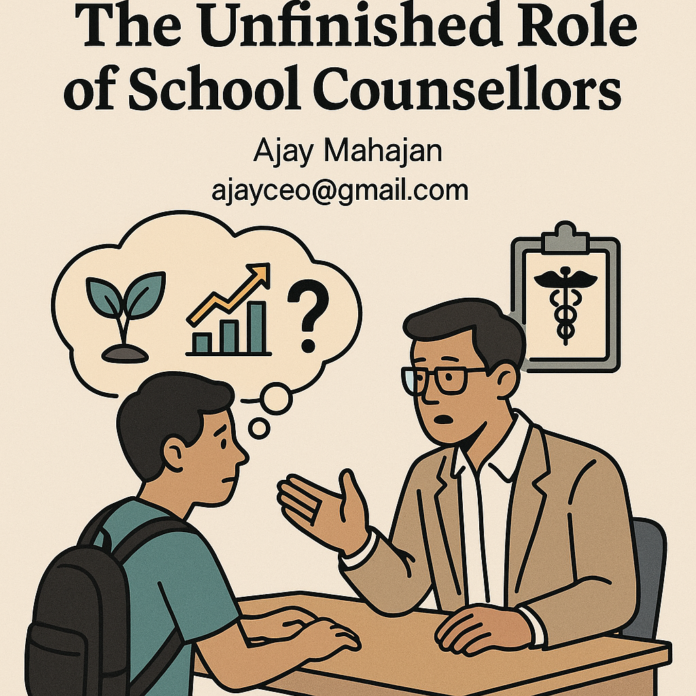Author: Ajay Mahajan
Email: ajayceo@gmail.com
This article is inspired by the experience shared with me by a student, Happy Singh. His journey made me reflect deeply on the unfinished role of many school counsellors in India’s education system.Happy once told me about his career counselling sessions in school. He was a bright student with diverse interests, particularly in sustainability and data sciences. Yet, when he sat with his counsellor, the only options seriously discussed were engineering or medicine. “I felt like I wasn’t being heard,” Happy said. “It was as if my counsellor didn’t know that careers beyond the traditional ones even existed.”Happy’s story is not unique. He recalled how one of his classmates wanted to pursue biotechnology but was advised to “pick commerce first and then figure it out.” Another friend who dreamt of studying abroad was discouraged because the counsellor wasn’t updated on international admission requirements. “We had to do most of the research ourselves,” Happy admitted. “The counselling we received often left us more confused than confident.”Listening to him, I realized this is not just about one school. Across many top schools in India, counsellors are still confined to outdated frameworks. They rarely highlight India’s own world-class universities or the exciting range of opportunities available globally. This gap denies students like Happy true exposure to the future that awaits them.Happy also shared how his school counsellor was overburdened handling teaching duties, event coordination, and administrative work along with counselling. “She wanted to help us, but she just didn’t have the time,” he said. As a result, counselling became more of a side activity rather than a structured, impactful process.What struck me most was when Happy said: “Teachers have exams like CTET, professors face UGC-NET, but our counsellor didn’t need any certification. Yet, she was shaping some of the most important decisions of our lives.” That statement stayed with me. If students are to trust the process, shouldn’t counsellors go through a professional certification system covering psychology, career knowledge, Indian higher education, and global admissions?Happy’s experience also highlighted something else mindset. “Counselling felt more about getting someone into a foreign university than about helping us discover what we really wanted,” he said. What he and his peers truly craved was empathy: someone to listen, guide, and help them align their strengths with meaningful opportunities.His words reminded me that counselling must shift from being admission-driven to student-centric. Students like Happy don’t just need lists of universities; they need mentors who understand their aspirations, who see them as individuals and not as checkboxes.If counselling is to be credible, it must be treated as a profession with rigour, expertise, and empathy. Policy interventions from the Ministry of Education and state boards could set guidelines, eligibility standards, and accreditation norms for school counsellors. That would ensure students across India, like Happy Singh, get informed, ethical, and future-ready guidance.Happy’s story is not just his own, it’s the story of countless young people who deserve better. And it’s time we listened.At the same time, I must acknowledge that there are also counsellors across the country who are doing their work at par excellence—bringing empathy, updated knowledge, and true mentorship into students’ lives. To those counsellors, I make a humble request: please guide, mentor, and inspire others in the profession so that together, we can build a stronger ecosystem of support for our students.



